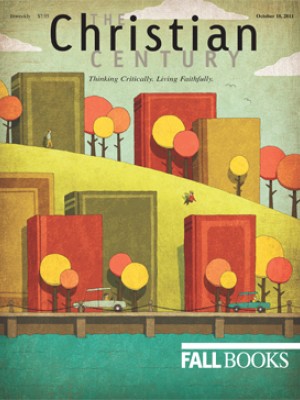Sunday, October 23, 2011: Deuteronomy 34:1-12
When I held my first grandchild in my arms, my perception of time was transformed. I began to ponder what his life would be like. I reflected on how it would be shaped by our responses to the challenges we are facing today—global climate change, economic uncertainty, nanosecond technology and the eclipse of the American empire. I realized that as a grandparent I will have to do my best to ensure that the world will become a safe and healthy place for my grandson and all the other children born in 2010. In an interdependent universe, after all, there are hardly any private actions; everything we do reverberates across the planet. What we do in the present shapes the future and the futures of those who follow us. We are always planting seeds for fruit that we will never harvest.
Yet the majority of our personal and corporate decisions are made with little consideration of their impact on generations to come. Businesses, institutions, governmental bodies and individuals have short ethical attention spans. For many of our leaders, the moral arc of responsibility goes no further than the next quarterly report, the next bottom line or the quick fix of a serious issue. Decisions are not made with the well-being of future generations in mind. Instead, shortsightedness coupled with self-interest and greed is a significant factor in today's economic and ecological crises.
Read our latest issue or browse back issues.
Morality is involved in every important personal, congregational and political decision we make. We should always ask: Will our decisions give our children and grandchildren a sustainable planet? Will our congregational and denominational priorities help our youth grow in wisdom, stature and spirituality? With Mother Teresa, we should ask ourselves if we're doing something beautiful for God in what we do today.
The lectionary reading describes Moses' final days. God gives Moses a panoramic vision of the land that had inspired his dreams and projects for over 40 years. Ever since his first encounter with God through a burning bush, Moses' long-term plans and day-to-day decisions had been shaped by the vision of a land that offered abundance and security. He challenged his people's waywardness and guided their journey through the wilderness. Most important, he looked beyond his own lifetime to secure the well-being of generations to come.
Although Moses had been faithful to his vision, he was not allowed to enter the land that had been promised to Abraham, Sarah and their descendants. He had to pass the torch to others; he himself would never taste the milk and honey that he had promised the children of Israel. Perhaps Moses was conflicted as he pondered his mortality. No doubt he wanted to kneel and kiss the soil of his spiritual homeland. But he may also have realized that he no longer had the energy to lead the people or deal with the complexities of governing the new land.
Letting go of control and allowing others to continue our work is an act of trust in God's ability to work creatively in the lives of our successors. Recently I left a seminary position after having created several successful programs in pastoral excellence and theological education. I found it difficult to let go of leadership and struggled to imagine these programs continuing with the same energy and care that I had given them. But I took comfort in knowing that my successor was a capable leader. Surely that's how Moses felt about Joshua. The new leader would learn as he went along and would guide the people in ways that both built upon and exceeded the achievements of Moses.
Over the years I have convened groups for pastors who are preparing for retirement. I know from being part of these groups that it's extremely difficult for pastors to let go of congregations they have loved and relationships that are dear to them. Sadly, some retired pastors remain on the scene. Often they create problems for their successors by insisting on a role in shaping their former congregation's future. But healthy ministry requires that they and we let go of the past and move on to our next adventures, trusting that God will make a way for our successors and for us.
Some pastors are exceptional in their gracefulness to those who follow them. A pastor friend of mine recently moved to a new congregation. His predecessor shared his wisdom with my friend and answered questions about the congregation and its members. The older man had no desire to shape his successor's ministry. Instead he blessed my friend, telling the new pastor that he would go to places that the older man had not imagined and shape the church in new ways. Then he let go, trusting the future to God's care and my friend's faithfulness.
There is a great deal of wisdom in a saying attributed to Martin Luther: "Even if I knew the world would end tomorrow, I would still plant a tree today." Moses died inspired by a mystical vision of his people's future. The certainty that God would continue to care for his people was enough for him: he had planted seeds that others would harvest.
Yes, the future is unclear at every level—congregational, national and planetary. We may not make it to our promised lands. But our calling is to plant trees of justice and beauty anyway. Like Moses, we need a vision to help us let go of the future while living responsibly in the present. Our faithful attentiveness to futures that we won't be part of is essential. As God's companions, our role is to commit ourselves to tikkun olam, mending the world.






